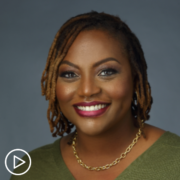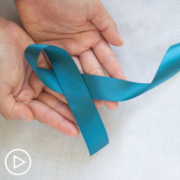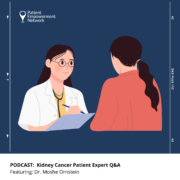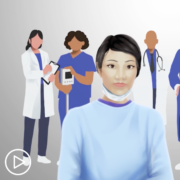Ovarian Cancer and Clinical Trial Participation: What Patients Should Know
Ovarian Cancer and Clinical Trial Participation: What Patients Should Know from Patient Empowerment Network on Vimeo.
What do ovarian cancer patients need to know about clinical trial participation? Expert Dr. Ebony Hoskins explains the importance of clinical trial participation and key advice for patients who are considering participation in a clinical trial.
Dr. Hoskins is a board-certified gynecologic oncologist at MedStar Washington Hospital Center and assistant professor of Clinical Obstetrics and Gynecology at Georgetown University Medical Center. Hoskins sees women for gynecological malignancies, which include the treatment of endometrial, ovarian, vulva, vaginal and cervical cancers.
[ACT]IVATION TIP
“…inquire with your doctor, ‘Am I a candidate for a clinical trial? Do you offer a clinical trial, are there clinical trials that would fit my scenario that’s local that I could go to? Are there clinical trials that are available, say, out of state that you think I will be a good fit for?’”
See More from [ACT]IVATED Ovarian Cancer
Related Resources:

|

Understanding Stages of Ovarian Cancer: What Should Patients Know |

|
Transcript:
Mikki:
Dr. Hoskins, why is clinical trial participation so important in ovarian cancer, and what advice do you have for patients considering a clinical trial?
Dr. Ebony Hoskins:
One, I always tell patients is the reason we know what to give you now, treatment is based off a clinical trial. So we need these trials. We didn’t just create a new drug and just gave it. We need to know, is it going to improve survival? What are the side effects? Is it going to kill the cancer? And so it’s important to be on the cutting edge if you will, of advancement in the field. The only way I know what to give patients is based off a clinical trial.
Right, so that’s number one. The advice for patients I have is, I think understanding what the options are for treatment, whether they come off of trial. So knowing if I’m not on trial, what am I going to get? If I am on trial, what am I going to get? What are the side effects? Side effects is an important thing. What are the safety issues? Because not only are there side effects, there can be a safety issue. I think one thing that we don’t really talk about that could be there, is some of the clinical trials depends on who’s sponsoring it, provide the drugs, and some of the drugs are quite costly, so that’s something that we’re not talking about.
The financial toxicity and sometimes coming under their trial, the drugs are covered, so you’re getting cutting-edge care that comes as maybe it’s not as costly to you, so I think, again, my activation tip for a patient is inquire with your doctor, “Am I a candidate for a clinical trial? Do you offer a clinical trial, are there clinical trials that would fit my scenario that’s local that I could go to? Are there clinical trials that are available, say, out of state that you think I will be a good fit for?” And sometimes…again, not every patient is a clinical trial candidate for a number of reasons, but asking the question, I think is huge.
Share Your Feedback:
Create your own user feedback survey










